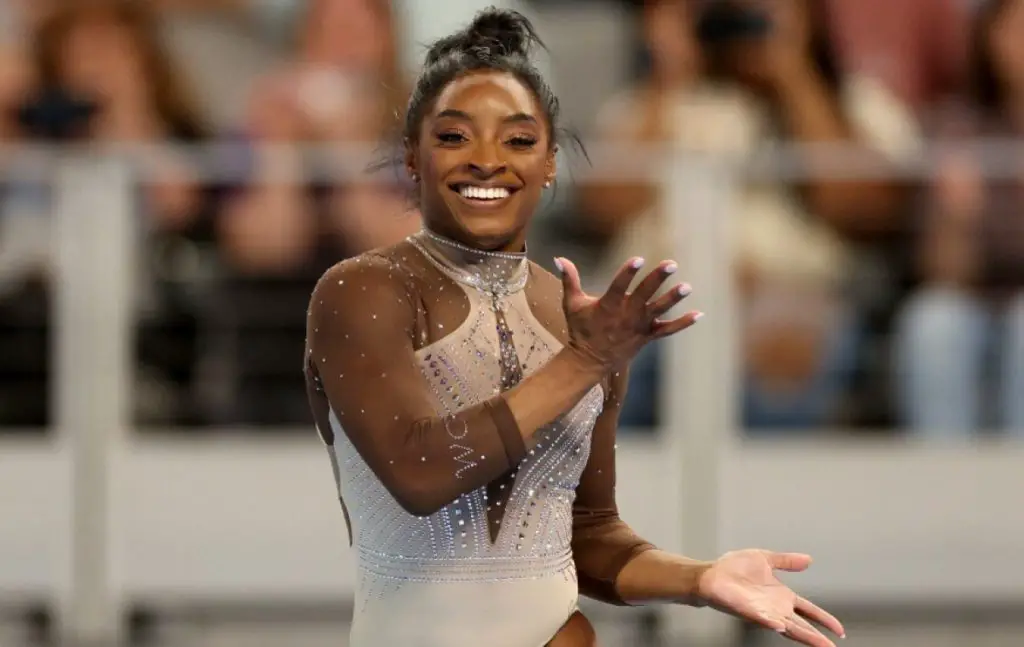
In a time where sports, identity, and social media often collide, one interaction between two high-profile athletes has triggered a wave of public commentary, drawing lines between advocates, critics, and everyone in between. The internet, never short on opinions, quickly became the arena for this confrontation—one that extends beyond two women and cuts to the heart of a much larger, emotionally charged debate.
The exchange began with a seemingly routine post celebrating a high school sports victory. But in today’s digital climate, even the most innocent content can become the spark that lights a cultural fire. What followed was a clash of ideologies, reputations, and deeply held beliefs—played out for millions to witness.
At the center of this storm stood Simone Biles—Olympic icon, national treasure, and a role model to young athletes everywhere—and Riley Gaines, a former NCAA swimmer who has become a prominent advocate for the preservation of single-sex competition in women’s sports. What started as a few words online quickly escalated into a national conversation.
The Post That Set the Stage
On a typical summer weekend, the Minnesota State High School League took to X (formerly Twitter) to congratulate Champlin Park for their victory as the Class AAAA Softball State Champions for 2025. The post featured a proud image of the team—smiling players, gold medals, a trophy held high under bright stadium lights.
But what was meant to be a moment of celebration quietly came with a surprising caveat: the comments section had been turned off.
That detail did not go unnoticed.
Former University of Kentucky swimmer Riley Gaines—now widely recognized for her outspoken views on protecting female athletic spaces—reposted the image and added her own biting commentary:
“Comments off lol. To be expected when your star player is a boy.”
Gaines’ post, unmistakably referring to the ongoing debate over transgender inclusion in women’s sports, ignited immediate attention. Her words struck a chord with her base of supporters—but also caught the eye of a far larger audience.
Simone Biles Responds—and the Internet Erupts
Among those who saw the post was Simone Biles. Known not only for her extraordinary gymnastics career but for her outspoken support of mental health and inclusion, Biles didn’t hold back in her response to Gaines’ comment.
Quoting the post, Biles wrote:
“@Riley_Gaines_ You’re truly sick, all of this campaigning because you lost a race. Straight up sore loser.”
It was a bold, unfiltered message from one of the most beloved athletes in the world—and one that instantly divided her fan base and drew massive attention.
Biles went on to accuse Gaines of bullying transgender athletes rather than working toward inclusive solutions. She suggested Gaines should be advocating for a third competitive category where transgender athletes could feel safe, rather than what Biles saw as “targeted harassment.” According to Biles, sports should be a safe space for everyone, regardless of gender identity.
Gaines Fires Back
Gaines didn’t remain silent.
She responded by expressing disappointment in Biles, stating that women should not be responsible for creating space for men in women’s sports. She emphasized her belief that women’s sports must remain exclusive to biological females in order to preserve fairness, safety, and equal opportunity.
In a subsequent Instagram post, Gaines wrote:
“Simone has turned her back on women and girls with dreams. Instead of defending our spaces, she chose to mock and attack. This is personal now.”
Gaines also accused Biles of body-shaming her in a follow-up tweet that read:
“Bully someone your own size, which would ironically be a male @Riley_Gaines.”
Gaines noted the irony of Biles’ comment, especially considering Biles herself has publicly dealt with criticism about her athletic physique in the past. She argued that such remarks undermine the very values of body acceptance and empowerment that Biles once championed.
Public Reaction: Polarized and Passionate
As the exchange circulated online, reactions poured in from all sides.
Critics of Biles voiced disappointment, with some arguing that her tone and personal attacks were unbecoming of an Olympic role model. One user commented:
“Simone called Riley a bully, but the words you’ve chosen, as an Olympian & role model, are disrespectful and rude.”
Another person added:
“And just like that, you are no longer a role model for little girls. Sad what has become of you, Simone.”
Some even claimed that Biles’ response marked a troubling shift in how dissenting opinions are treated in public discourse, especially when it comes to sensitive issues like sex and gender.
However, support for Biles was also fierce and vocal.
Supporters applauded her courage in speaking out for inclusivity, thanking her for standing up to what they viewed as anti-trans rhetoric. One supporter posted:
“This is real leadership. Thank you for standing up, Simone. You are the GOAT in more ways than one.”
Another wrote:
“You didn’t just perform on the floor, vault, and beam. You’re now showing moral strength off the mat too.”
Yet another tweet, receiving thousands of likes, read:
“I didn’t think it was possible to respect you more than I already did. But you continue to show class and strength.”
The Bigger Battle: Sports, Identity, and Inclusion
The Biles-Gaines clash isn’t just about a tweet. It reflects a much broader, ongoing debate that continues to play out in courtrooms, legislative chambers, and locker rooms across the country.
At its core, the issue revolves around whether transgender women should be allowed to compete in female sports divisions. Proponents argue for inclusion, fairness, and recognition of identity. Opponents argue that biological differences create unfair advantages and that women’s sports risk being undermined by allowing male-bodied athletes to compete.
Gaines has positioned herself as a leading voice for the latter, having launched a national campaign to defend single-sex spaces. Her activism began in 2022 after tying with Lia Thomas—a transgender woman and former UPenn swimmer—during the NCAA Division I Swimming & Diving Championships.
That experience, Gaines says, changed her life.
She has since testified before Congress, spoken at college campuses, and worked with women’s rights organizations advocating for legal definitions of “woman” and protections for Title IX, the federal law guaranteeing equal opportunities in education.
Biles, on the other hand, has increasingly used her platform to advocate for inclusion and to call out what she sees as toxic gatekeeping in sports culture. Her stance aligns with many progressive athletes and organizations that view trans inclusion as a civil rights issue rather than a competitive one.
The Fallout Continues
As the digital dust continues to settle, the consequences of this clash are still unfolding.
Gaines has doubled down on her criticism, suggesting that Biles’ remarks weren’t just wrong—they were hypocritical.
“It’s deeply ironic,” she said in a video posted to Instagram. “Simone has faced ridicule and discrimination for her body and her courage. But now she’s doing the same thing to other women who disagree with her.”
Meanwhile, Biles has not deleted her posts. If anything, she has leaned further into her stance, engaging with supporters and sharing messages of encouragement from fans who appreciate her willingness to speak up.
The controversy has led to renewed scrutiny of how professional athletes use their platforms and what responsibilities come with public influence.
Media Coverage and Cultural Impact
Major news outlets, sports networks, and opinion pages have weighed in, each framing the story through different lenses—freedom of speech, the boundaries of activism, the future of women’s sports.
Some pundits praised Biles for not staying silent and taking a firm stand. Others warned that her comments could alienate a large portion of her fanbase and potentially harm her reputation in conservative circles.
Meanwhile, Gaines has seen a boost in her visibility. Her follower count has grown, and she’s scheduled to appear at several high-profile events focused on women’s rights and athletic equity.
The exchange has also reignited calls for sports organizations to develop more transparent policies regarding transgender participation, with critics arguing that current guidelines vary too widely and often leave athletes and schools confused or in conflict.
What Happens Next?
There’s little doubt that this clash will be remembered as a defining moment in the evolving conversation around gender and sports. Whether it leads to policy changes, increased activism, or deeper divisions remains to be seen.
But it has already achieved one thing: It has forced people on all sides to confront uncomfortable truths, examine their values, and consider what kind of sports culture they want to build—for themselves, their children, and future generations.
In the words of one social media user:
“This isn’t about winning medals anymore. It’s about deciding what fairness, compassion, and competition look like in 2025 and beyond.”


